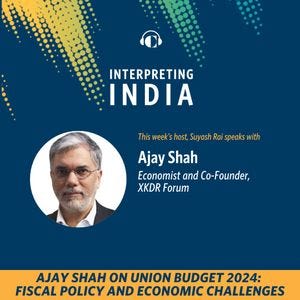XKDR Newsletter - Issue 29
India's debt management strategy • Electricity policy • Climate finance • Alt data • Land-titling • Union Budget 2024 • Digital Courts • Legal System Reforms
Who lends to the Indian state?
Much of Indian public finance research has focused on the level of debt and deficits. In this working paper, Aneesha Chitgupi, Ajay Shah, Manish K. Singh, Susan Thomas and Harsh Vardhan examine the structure of lenders to the Indian state. To what extent is this lending coerced? Is the present debt management strategy consistent with the objectives of low cost borrowing for the government in the long run, while preserving efficiency in the economy, and retaining the optionality of surging borrowing when faced with rare events? They find 5% of the lending to the Indian state comes from voluntary sources. While financial repression for banks eased /de jure' with a decline in the SLR from 33% in 1988 to 18% in 2021, lending to the state beyond regulatory requirements was Rs.30 trillion in 2021. Alongside this, the growth of the pension and insurance industries created new pools of assets where financial repression generated bountiful lending to the government. These facts help re-examine debt management strategy in India.
Read the full paper here.
OP-ED & COMMENTARY
In his column in the Business Standard, Ajay Shah writes on “Electricity: A strategic view”, with Akshay Jaitly and K.P. Krishnan. They write on the economic adjustment necessary for decarbonisation by 2050, and how India has begun the shift away from fossil fuels but the renewable energy (RE) buildout is not yet equal. They argue that there are three kinds of complacence in the field - the belief that the government will build everything required in a feckless coal-intensive way, or that the private sector is building ample RE, or that somehow muddling along will continue to work. They believe that the way forward lies in shifting to a price system approach in electricity policy, and intensive work in financial sector reform for climate finance.
VIDEOS AND PODCASTS
New episodes of XKDR’s YouTube series Big Ideas - conversations with some of the leading thinkers of today - are out:
The new world of alt data, with Hemen Sampat: Ep 25
Market-based solutions for India’s land-titling issues, with Anirudh Burman: Ep 26
New episodes of Ajay Shah’s YouTube show Everything is Everything with Amit Varma are out:
Can We Build Switzerland in India? Ep 58
Rethinking Innovation Policy, Ep 59
Don't Run a Country Like a Company, Ep 60
The Outlaws, Ep 61
How to Write a Paper, Ep 62
Ajay Shah speaks with Suyash Rai on Carnegie India’s Interpreting India podcast to explore the complexities of India's fiscal policy and the current economic challenges.
They discuss these questions - What are the implications of the union budget for 2024–25? What are the strategic choices underlying fiscal deficit management? How can broader institutional and policy reforms drive sustainable growth in India?
EVENTS
The High Court of Kerala launched a dedicated 24 x 7 'ON' court for the adjudication of cheque bouncing cases in the district of Kollam, on 16th August. This digital court will focus on simplifying processes and providing open information to litigants. XKDR provided research support and suggested design and process changes as a member of the PUCAR collective, advising the High Court of Kerala.
Ajay Shah authored an article for the Business Standard on this - “New work on district courts in Kerala”.
Book Talks
We hosted two book talks by Gurcharan Das, a celebrated author and public intellectual:
"The Dilemma of an Indian Liberal" - For two centuries, liberal democracies and free markets spread around the world. India's 1991 market reforms brought millions out of poverty and created a new middle class. However, liberalism is in retreat. The debate appears to be about economic freedom versus political freedom - as if it is a given that the two cannot coexist. In order to elucidate the dilemma of the Indian liberal, Gurcharan Das recounts his own professional and intellectual journey of becoming a liberal. While telling his story, he also narrates the story of a nation struggling-still- to become a successful liberal democracy- the late promise and its seeming betrayal, but also the possibility of course correction.
"Another Sort of Freedom: A Memoir"- Another Sort of Freedom is a funny, moving and honest memoir of a man's struggle to break free from expectations. Gurcharan Das was born in Lyallpur, Punjab, during World War II, when Hitler, Churchill and Hirohito were bashing everyone around. There are strange twists in his journey, from Partition's chaos to misguided attempts at winning over first loves. Setting out to become an engineer, he ends up with a philosophy degree from Harvard University. He then abandons a promising academic career in ivy-covered halls to become a salesman for Vicks VapoRub in India's dusty bazaars. This leads him to the CEO's position of Procter & Gamble India. One day, at the peak of his professional life, his high-powered corporate mask crumbles, and he walks away to become a celebrated writer and public intellectual. The memoir is filled with moments of deep introspection at every turn alongside wise observations on the author's encounters with history on four continents.
Upcoming
We are hosting Seminar #9 of the Indian Legal System Reform series on 6th September 2024. This seminar series brings together researchers, policymakers, practitioners, civil society members, and other stakeholders to discuss, debate, and explore potential improvements for a better legal system and policy pathways for effective implementation.
The recordings of our previous seminars are here. To attend, please register here.
XKDR Forum is an interdisciplinary research and policy organisation harnessing knowledge and capabilities across diverse fields of economics, law, public administration, engineering, statistics and science. We welcome your comments and suggestions on our work. Please write them to us here.



